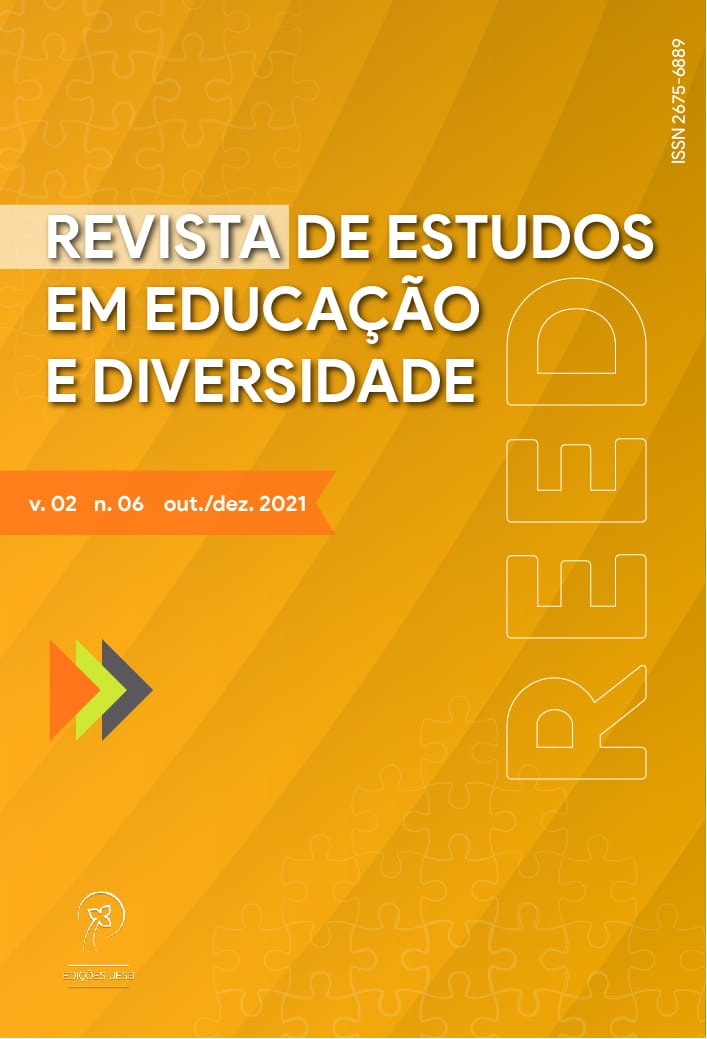IMAGINATION AND CREATION IN ONTOGENETIC DEVELOPMENT: CONTRIBUTIONS FROM THE HISTORICAL-CULTURAL THEORY
DOI:
https://doi.org/10.22481/reed.v2i6.9832Keywords:
Imagination, Creation, Historical-Cultural Theory, L.S. VygotskyAbstract
Theorizations about the genesis of the process of organizing the conscious activity of human beings are a mark in the writings of L. S. Vigotski (1896-1934). In the course of the development of consciousness, imagination – understood as a complex activity – is characterized as a psychological system of interfunctional relationships that occupies a central position and gains specific contours throughout ontogenesis. In this article, we review the Vygotskian work with the aim of analyzing the development and contours of imaginative processes throughout childhood and adolescence (ontogenetic periods studied by the author). We argue that the human condition, essentially and ontologically, is linked to imaginative processes, as by creating intentional strategies for survival and action on nature, the individual becomes capable of operating psychically through the production, reproduction and creation of images.
Downloads
References
LEONTIEV, Alexei. O homem e a cultura. In: ENGELS, Friedrich (et. al). O papel da cultura nas ciências sociais. Porto Alegre: Editoral Vila Martha, (pp. 37-72), 1980.
LURIA, Alexande. Curso de Psicologia Geral – Introdução Evolucionista à Psicologia. Volume I. Rio de Janeiro: Editora Civilização Brasileira, 1991.
MARX, Karl; ENGELS, Friedrich. A ideologia alemã. São Paulo: Expressão Popular, 2009.
MUKHINA, Valéria. Psicologia da idade pré-escolar. São Paulo: Martins Fontes, 1995.
PETROVSKY, Alexis. A imaginação. In: LONGAREZI, Andréa; PUENTES, Roberto. Ensino desenvolvimento – Antologia – Livro 01. Uberlândia: EDUFU, (pp. 181-198), 2017.
PINO, Angel. As marcas do humano: às origens da constituição cultural da criança na perspectiva de Lev. S. Vigotski. São Paulo: Cortez. 2005.
PINO, Angel. As marcas do humano: pistas para o conhecimento da nossa identidade pessoal. Educação e Sociedade, Campinas, v. 39, n. 142, p. 227-236, Janeiro, 2018.
RUBINSTEIN, Serguei. Princípios de psicologia geral – volume IV. Lisboa, Editorial Estampa, 1973.
SAWAIA, Bader; SILVA, Daniele Nunes. Pelo reencantamento da Psicologia: em busca da positividade epistemológica da imaginação e da emoção no desenvolvimento humano. Caderno CEDES, Campinas, v. 35, n. spe, p. 343-360, dez. 2015.
TOASSA, Gisele. Emoções e vivências em Vigotski. Campinas: Papirus, 2011.
TOASSA, Gisele. Emoções e vivências em Vigotski: investigação para uma perspectiva histórico-cultural. 2009. Tese (Doutorado em Psicologia) - Universidade de São Paulo, São Paulo, Brasil. 2009.
VIGOTSKI, Lev Semionovich. Teoria e método em Psicologia. São Paulo: Martins Fontes, 1996.
VIGOTSKI, Lev Semionovich. O desenvolvimento psicológico na infância. São Paulo: Martins Fontes, 1998
VIGOTSKI, Lev Semionovich. Psicologia pedagógica. Porto Alegre: Artmed, 2003.
VIGOTSKI, Lev Semionovich. A brincadeira e o seu papel no desenvolvimento psíquico da criança. Revista Virtual de Gestão de Iniciativas Sociais, junho, 2008.
VIGOTSKI, Lev Semionovich. Imaginação e criação na infância. São Paulo: Editora Ática, 2009.
VYGOTSKI, Lev Semionovich. Obras Escogidas IV – Paidología del adolescente – Problemas de la psicologia infantil. Madrid: Machado Libros, 2012.
VYGOTSKY, Lev Semionovich. Obras Escogidas VI – Herencia científica. Madrid: Machado Libros, 2017.
WALLON, Henri. A evolução psicológica da criança. São Paulo: Martins Fontes, 2007.
WALLON, Henri. Do ato ao pensamento: ensaio de psicologia comparada. Petrópolis: Editora Vozes, 2015.
Downloads
Published
How to Cite
Issue
Section
License
Copyright (c) 2021 Revista de Estudos em Educação e Diversidade - REED

This work is licensed under a Creative Commons Attribution 4.0 International License.
You are free to:
Share - copy and redistribute the material in any medium or format; Adapt - remix, transform, and build from the material for any purpose, even commercially. This license is acceptable for Free Cultural Works. The licensor cannot revoke these freedoms as long as you follow the terms of the license.
Under the following terms:
Attribution - You must appropriately give credit, provide a link to the license, and indicate if any changes have been made. You may do so in any reasonable way, but not in a way that suggests that you or your use is endorsed by the licensor.
There are no additional restrictions - You cannot apply legal terms or technological measures that legally restrict others to make any use permitted by the license.






